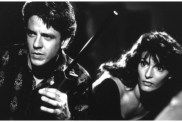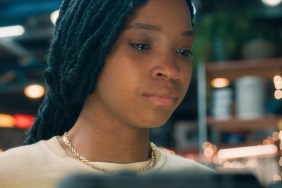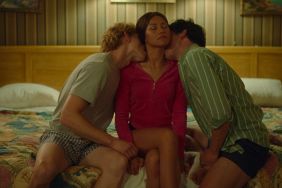There are few directors who have gained as much credibility for their ability to bring history to life than Tom Hooper, who having won an Emmy for his direction on the 2005 HBO movie “Elizabeth I,” starring Helen Mirren, followed it up with “Longford” and the HBO mini-series “John Addams,” both which also received numerous awards. Having been a mainstay on HBO for many years, Hooper’s first theatrical feature The Damned United, starring Michael Sheen and Tim Spall, about controversial football manager Brian Clough, did well over in England but barely made a mark Stateside.
Even so, it’s likely Hooper’s reputation for riveting historic filmmaker will reach a new pinnacle with his latest film, The King’s Speech. In fact, based on the amount of buzz and adoration the film has been receiving for its inspirational tale of the King of England’s struggles with a speech impediment and the Australian speech therapist who helped him overcome that obstacle, it’s likely Hooper will not be thought of as “the guy who directed ‘John Addams'” for very much longer.
Based on a screenplay by David Seidler, who also made his name writing TV movies, the film explores the relationship between Colin Firth’s Albert, the Duke of York and future King George VI, and Lionel Logue, the speech therapist played by Geoffrey Rush, both of the two actors doing some of their best work under the guidance of Hooper.
ComingSoon.net sat down with the director at the New York junket for the film for the following interview:
ComingSoon.net: Now, obviously you had great success with “John Adams,” so was this something your agent found and sent you or did you hear about the script and sought it out?
Tom Hooper: Oh, I think it was a great story, so I can honestly say I only came to this material because I happen to be half-Australian and half-English, which also makes me uncannily suited to the material. My parents live in London and my Australian mom was invited by Australian friends of hers to a play reading at a tiny fringe theater of an unrehearsed, un-produced play called “The King’s Speech” in late 2007. They wanted her there to make up a kind of token Australian contingent. She almost didn’t go, it didn’t sound that promising, but in the end, they’re good friends, so she said yes. She came home and said, “I’ve just seen this play and I think I’ve found your next film.”
CS: Holy crap, wow.
Hooper: Isn’t that extraordinary?
CS: Is your mother your agent as well?
Hooper: I mean, she’s a writer. She’s a kind of combination. She’s mainly a children’s writer, but she’s published over 60 books, so she’s pretty astute about stories, so that’s the context of her having a good brain, but no, it was an amazing thing and particularly because her Australian-ness also meant that for years I wanted to do a film that deals with the English-Australian relationship because of my upbringing. One of the narratives of my childhood growing up was to see Mom unpacking and my dad and his English upbringing, so this was a story that I knew inside out.
CS: The amazing thing about this movie is that on paper, it doesn’t really sound that interesting–a king with a stammer problem having to overcome it–even if you know Colin Firth and Geoffrey Rush are in it, both of whom I love, it’s not something on paper that sounds particularly interesting. When people first saw it at Telluride, they were completely blown away and that’s when all the excitement started. When you first got the script and were reading it, did you immediately have the same kind of reaction as those who’ve seen the movie?
Hooper: Yeah, I mean, well put it this way, I often read scripts and then agonize for weeks whether to do the film or not and meet the people. This was like, “Yeah, great, that’s my next movie.” It was like that. The script, it worked, yes, but it’s such a good story, you know? I mean, yes, if you pitch it by saying it’s about a stammer problem, but it’s the fact that the guy with the stammer is the younger brother to the King of England who then unexpectedly has to become King with a stammer, right at the moment when radio was taking off as a mass medium, right at that time when radio was only a live medium, so you couldn’t prerecord, you couldn’t take out the stammers, and you’ve got the Second World War approaching when you’re expected to stand up and speak to the nation. That’s an extraordinary story, and no one knows until now that the guy who got him through this was this one iconic maverick, Australian speech therapist, a failed Shakesperean actor, not even a doctor.

CS: It’s pretty amazing how this project came together, so at what point did you realize that Colin and Geoffrey would be so amazing together? Was it literally at their first table read?
Hooper: No, it was the first day of shooting. The first day of shooting we did the very first scene where they meet because I wanted some of the nerves of the first day of shooting to go into the nerves of their first meeting as characters. You know, you’ve seen that scene I assume, it’s like they’re so good in it, and that was my first day. We’d done three weeks of rehearsals, so a lot of work had got to that place, but that was when I just thought, “My God, I’m onto something with these two men.”
CS: I saw the movie just after Telluride, and there was already a lot of buzz about it, and yet, the movie wouldn’t normally be a hard sell if Colin weren’t getting Oscar buzz similar to “A Single Man” last year. So I was curious about your thoughts on awards. It does bring attention to the craft and let people know a movie is worth seeing–and you’ve deal with this on most your HBO films–but do you find it’s a distraction from the film?
Hooper: You know, I have to say at this stage, the movie’s yet to make a dollar at the box office. I know people want me to think about it, but I’m really just focused on the release and the marketing materials and just making sure that we protect the release because I made this for people to see. I didn’t make this for the award season, I made this for people to have that experience in the cinema. I’ve now sat in Telluride at ten and a half thousand feet, I’ve seen it in Canada, I’ve seen it in L.A. in the Chinese Theater. I’ve seen it in London in the Odeon Leicester Square, which is our big, famous cinema. I’ve seen it in New York, and wherever it goes, it’s completely democratic in its reach. People laugh in the same places; they are moved to tears. I want people to have that experience in the cinema. I guess, sure, it will be great on DVD, but it’s a great communal cinema experience to have. If people go to the cinema, they won’t be disappointed. It’s a great experience, so that’s my focus, is just making sure that people really go out to the movie theater to see it.
CS: How much research and preparation do you do for a movie like this after having worked on “John Addams” and other things that must require a ton of research?
Hooper: From the moment I’m in pre-production, I never stop. If I’m not making a film, I’m researching a film. Even during the shoot, I’ll still be reading things and checking things because how can you be casual about that? These are real people’s lives and you owe them the respect of doing all the work you can to try and find it out. I mean, on “John Adams,” it was a hell of a tough thing to basically… when HBO asked me to do it we were like four or five months out, and I knew nothing about the American Revolution because you don’t get taught it in English schools. To get up to speed on that in that kind of time while casting over 200 speaking parts and rec’ing locations in Hungary and London and Richmond and Virginia and supervising just the colossal nature of a nine-hour script, while researching this huge thing, but I think research is my friend. Research leads me towards subversive imagery, it leads me towards surprises, it leads me towards more interesting storytelling than you can get through just sitting and writing in your room.
CS: Earlier, David (the screenwriter) mentioned they were able to get their hands on Lionel Logue’s diaries but it wasn’t very long before you actually had to shoot the movie.
Hooper: It was nine weeks before.
CS: So how did that change things? You probably already had a lot of ideas how things were going to go, I’d imagine.
Hooper: We just improved it. We not only made it more accurate, but we made it better. I mean, there were some of the best lines of dialogue, the funniest lines of dialogue that came from the diaries, so for example, at the end of the big speech, Lionel says, “Well, you still stammered on the W,” and the King says, “Well, I had to throw in a few so they knew that it was me.” Written by King George VI and Lionel Logue, last spoken out loud by King George VI and Lionel Logue, written down in Logue’s diary. My production designer, Eve Stewart, who’s very research-obsessed, did discover that Lionel Logue’s grandson Mark Logue lived in London 10 minutes from where I lived and in Mark’s attic were these handwritten diaries. Fragments of autobiography, even Bertie’s original medical report card describing him as having a weak diaphragm. It was a treasure trove of information. This was information no historian has ever read, seen, no royal biographer has even seen, the royal family has ever seen, and I got it first. I mean, amazing. But, you’ve got these clues, like that exchange I just told you shows that the King has a wonderful wit, and then we would make sure that the wit was there throughout because the diaries gave us clues into people. They didn’t give us everything, of course. I mean, the diaries only start with the coronation of The King.

CS: He didn’t keep diaries beforehand?
Hooper: No, and it was then suddenly he becomes a celebrity and he’s like, “Oh my God, I’ve gotta write it down.” I think that was interesting, but so David had to imagine all the earlier stuff, but that was great.
CS: Did Mark have any interesting anecdotes about his grandfather?
Hooper: Well, not so much. Mark, I think, didn’t really remember him. Well, I met another grandson of Logue who came to the London premiere, and this was interesting. Lionel Logue died a year to the day after King George VI. Basically, when the King passed, it was as if he was ready to go too. It was like an old married couple.
CS: You’ve seen this with a lot of different audiences, and I’d think it would be interesting as a filmmaker, but what’s the biggest difference between American and British audiences and their reaction to it.
Hooper: It’s stunning. It’s hardly different. You could put a piece of paper between them.
CS: Right, but British folk will see them as the father and mother of their queen.
Hooper: It’s unbelievable. I mean, it’s like, wow, if you ever thought Americans and the English were culturally close, but then in some ways, the Queen is no closer to us in England than it is to you in America. I mean, we don’t hang out with the Queen, so we’re not that close to the monarchy, it’s very distant.
CS: I’ve spoken to Peter Morgan a number of times over the years going back to “The Queen,” and I’m always curious how the monarchy may react to a movie like this. Do you have any idea whether anyone in the Royal Family has had a chance to see your movie yet?
Hooper: No, we still don’t know whether the Queen watched “The Queen,” and we still don’t know what she thinks or what she felt, so the chance that I’m gonna know whether she watched my film and what she thinks, who knows? I think what’s interesting about if you compare Peter’s film and this film is that they’re both about the effects of the mass media on the institution of the monarchy. My film is about the effect of the coming of mass media through the radio, which created this huge pressure on the King to become an actor and a performer. In the case of Peter’s film, it was the effect of the mass media on what was expected from the royal family in terms it being about connection (to the people). In the case of Bertie, it was the fear that because of his stammer, he wouldn’t connect and with the coming of War, he needed to connect. In the case of “The Queen,” the Queen wouldn’t connect, but she refused to, but the mass media world wanted her and needed her to make that connection. The mass media requires this kind of emotional connection from readers. When you talk about any suit of armor, does he connect enough emotionally when he’s talking and did he get it right? It’s become terribly important because people can be hugely emotionally connected and fail to communicate it on television. It doesn’t necessarily mean they’re not, but the performance is all now in the modern culture. The performance is all.
CS: I think the speech that Michael Gambon gives about the monarchy having to be actors is very interesting and the fact that Dave approached the screenplay from a very personal angle, basically being able to relate to Bertie, it’s interesting that he was able to capture that extra layer. So was that something always in the script?
Hooper: I think the script is only good because David was a stammerer and has childhood memories of King George VI. It’s a classic example – if as a writer you talk about a subject that’s closest to your heart, more likely than not you’re actually going to write a great piece. The sadness of so much screenwriting is people are chasing what they think the studios want, what they think the audience want, and they write out of their own experience. I mean, how many writers have had to write about detectives where they’ve never spent a week in the police force? How many have to write about murder stories when they’ve never experienced it? So they borrow it from other movies about it, and they write out of a closed world of other films. I think David’s written the best film of his life and he’s written it because he’s talking about his childhood and the most traumatic time in his childhood, and he knows it. He knows this stuff.

CS: You’ve talked about the R-rating the movie was given and it’s kind of ridiculous that it’s the difference between one f*ck or two. There’s no sex or nudity or violence and a few other movies have been labeled with an R for the same reason. Looking at the ratings system as an outsider, do you feel that something has to change?
Hooper: I feel like this culture is so permissive about violence. I have never been traumatized in my imagination by a swear word in a film, it’s never lingered with me, it’s never haunted me. I have been haunted, and sometimes even traumatized by scenes of violence in many films. I mean, Jesus, that scene in “Witness” in the loo with the little kid, that stayed with me forever. I mean, look at that. I can’t go into a loo in an airport without being a little anxious to this day. It’s had a lifelong effect on me. That is the power of cinema to the young mind. In Peter’s case, I don’t mind it, because it’s such a wonderful movie, but “Witness” was 1960 – I was 13. I mean, I was not six. It’s like, that’s what I don’t understand. This is about not traumatizing people, and that should be the thing. It’s like that scene in “Salt,” which I saw recently, where they force a plastic tube down Angelina’s throat, they then pour water down it to simulate drowning. You know, that image is in my head in an unsettling way, and I would like it out of my head. I’m 38 and it’s still disturbing me, so this has gotta correct this thing, because it’s completely out of whack.
CS: I have two more questions. Obviously you’ve been kind of drawn to this kind of historic films or films based on real people, as has Peter Morgan, but it does involves lots more research. Have you felt like doing a movie that doesn’t involve so much time doing that research beforehand?
Hooper: I only do one project a year, so my output is pretty good and I don’t think it’s slowing me down.
CS: Sure, but doing eleven months of research before each film…
Hooper: No, it’s not. For “John Addams,” I had a five month prep and my research was all happening within prep, and on this, I did most of my research within prep. Look, I don’t know. I mean, next year, I’m gonna make the best script I get. If it’s period, fine, if it’s historical, fine. If it’s original fiction, fine. If it’s sci-fi, fine. I’ll do the best piece of material that I think is out there, because I want to give people the best stories I can find. I think this story’s really great, that’s why I did it. I happen to think that part of the problem now is (that) it’s rare that I read a piece of original contemporary screenwriting where the characters are as complex or the story is as good as some of these historical things that people are doing. But God, I would do it like a shot if it was good.
CS: My last question is do you think we’ll ever see another movie with Tim Spall playing Winston Churchill? I absolutely love Tim Spall in general, and I thought he was amazing as Winston Churchill and would love to see more of Chuchill’s life as played by Tim Spall.
Hooper: Well, the great thing about Churchill was he lived to such a grand old age. Tim’s probably got 20 years when he could play Churchill, so I hope someone will see it and make the Winston Churchill stories.
The King’s Speech opens in select cities on Friday, November 26.









